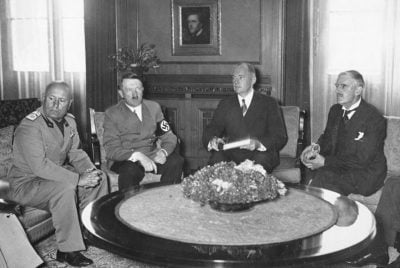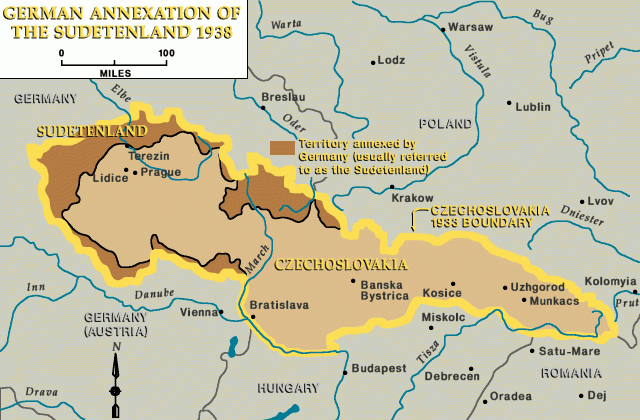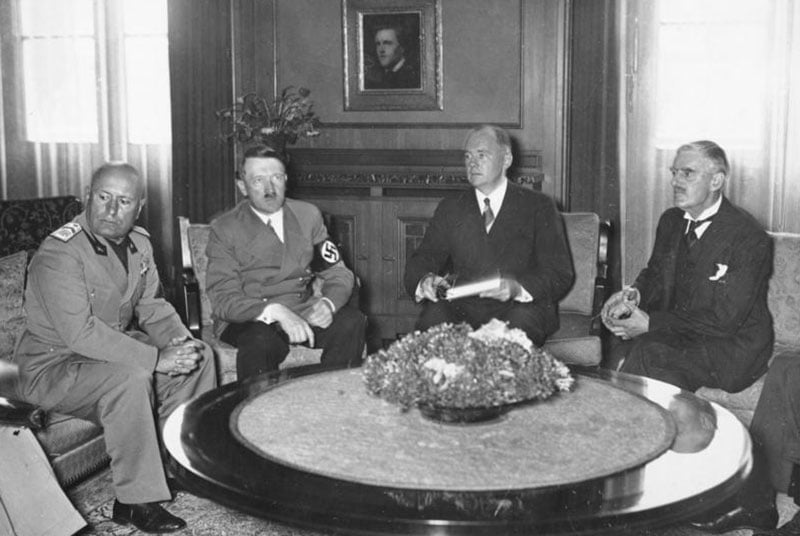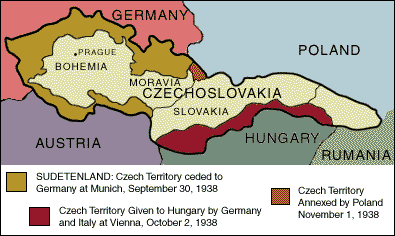The History of World War II: The War Started in October 1938

First published on October 2, 2019.
Historians, media pundits and politicians have managed to postulate, and impose it into the history annals, encyclopedias and school books that the Second World War was started in September 1939 by Nazi Germany’s invasion [1] and prompt defeat[2] of Poland.
This version is definitely appealing to several generations of Western leaders in their ongoing anti-Russian paranoia, insinuating an implicit guilt – or at least a degree of complicity – by the Soviet Union, which, in compliance with its treaty with the Germans[3], a few weeks later[4] proceeded to advance to the agreed upon common border with the Third Reich, thus recovering the lands of the Russian Empire that were lost 20 years prior to that during the tumultuous years of WWI, the Russian Revolution and the Civil war.
The fact that Japan, a key participant in the war had started its military campaigns in 1937 and through 1938 had conquered parts of China, Manchuria, and fought the Soviet Union, is typically discarded, either because the conflicts have been fought 1:1 or because this was Asia[5]. We could argue either way but for now let’s close our eyes to that and focus on Europe, center stage of homo sapiens thus far greatest man-made disaster, which we denote as WWII, wherein at least 70 million people from no less than 30 nationalities lost their lives.
Until recently I have been satisfied by above version as I, too, did not know better. Until the moment publications have surfaced about the actual course of events triggering hostilities, including simultaneous[6] armed conflicts and land invasion followed by occupation, between several states[7]. Regardless who wanted to cover for whom, my conclusion was that:
World War II started in October of 1938 by Germany, with the support of Poland and Hungary attacking, invading, and eventually annihilating the sovereign republic of Czechoslovakia!
The Munich Agreement is signed[14] by Chamberlain, Daladier, Mussolini and Hitler, which stipulates that the European Powers agree to break up Czechoslovakia of which Sudetenland is to be annexed by Germany starting on Oct. 1st and to be completed by Oct. 10th; within 3 months Czechoslovakia is to give up its lands on which claims are laid by Poland and Hungary
Here is the sequence of events
A) Preparatory phase
- 1934 = Mutually assured Non-Aggression Pact Germany-Poland is signed for 10 year period.
- 1935 = During a visit to Warsaw H. Goering, appointed by Hitler to lead and groom a warming German-Polish relationship, proposes to his hosts to join in a “probable” future expansion to the East promising them a part of Soviet Ukraine as a war trophy /1/.
- 1938 = March 13th: Austria ceases to exist, and without any objections whatsoever the Austrians become citizens of the Third Reich– a post factum plebiscite is carried out as well.
- 1938 = March 17th: Encouraged by the success of its ally, Poland presents Lithuania with an ultimatum, demanding that it (i) enacts a change in its constitution wherein Vilnius, occupied by the Poles since 1922, is still mentioned as its capital city, and (ii) gives up that territory. Unless within 24 hours the Lithuanians accept these demands, Poland threatens to attack Kaunas and occupy the remainder of the tiny country.
- 1938 = Sept. 19th: The Polish Government expresses its agreement with Hitler’s opinion that Czechoslovakia is an artificial creature. Poland also expresses support to Hungary’s claims in its territorial dispute with Czechoslovakia.
- 1938 = Sept. 20th: Hitler gives official guarantees to Jozef Lipski, Polish Ambassador in Berlin, that in a “probable” Polish-Czechoslovakian military conflict over Czech Teshin region[8] Germany will support the Polish side. Full agreement is reached about coordinated German-Polish military action against Czechoslovakia.
- 1938 = Sept. 21st:
Large border conflict is provoked in the early morning hours at the German-Czech border.
Poland presents Czechoslovakia with a note demanding solution of the problem with Polish national minority in Czech Teshin, Silesia. - 1938 = Sept. 22nd: Polish Government issues an express announcement by which it denounces Polish-Czechoslovakian Treaty about the national minorities. Later that same day Poland presents Czechoslovakia with an ultimatum about annexation of its territories hosting Polish inhabitants.[9]
- 1938 = Sept. 25th: Various attacks take place in the Teshin region:
- At Konska, near Trshinec, the Poles attack (by gunfire and grenades) the barracks of the Czechoslovakian border garrison, as a result of which two buildings are burnt out; after a couple of hours gunfight the attackers withdraw back to Polish inland.
- Polish band attacks by gunfire and grenades the railway station of Frystat.
- 1938 = Sept. 27th: Poland issues a second demand for “return” of Teshin region. During that night the whole of the Teshin region is pierced by the sound of gunfire, including that by machine guns. The official Polish news agency reports that the most bloody confrontations took place in the vicinity of Bohumin, Teshin and Jablunkov, in Bystrica, Konska, Skrshechon. Armed groups of “rebels”[10] repeatedly attack Czechoslovak army’s gun and ammunition depots and Polish airplane routinely violate Czechoslovak air space. The real news is scarcely reported abroad, except for “Pravda” in the Soviet Union /2/11.
- 1938 = Sept. 29th:
1. The infamous Munich conference begins, in rather peculiar manner: the high representatives of the four Central European Powers deliberate, in the presence of other nations’ observers, but the party whose fate is being discussed and decided upon – and by whose authorization this whole thing proceeds is not questioned at all – is not allowed in; it awaits the news about the verdict in a separate room…
2. Polish diplomats in Paris and London insist on equal approach to the “solution” of Sudeten- and Tesh-in-“problems.” Separately, Polish and German officers conclude agreement on the demarcation line between their respective armies, in case of invasion.
3. German and Polish newspapers report touching scenes of “comrades in arms”-type brotherhood in meetings between Nazis and Polish fascists.[12]
4. A Czechoslovakian border post near Grgava is attacked by a 20 member gang armed with automatic weapons. The attack fails, attackers are repelled and flee to Poland, except a captured wounded man, testifying that the group included many Germans living in Poland…
B. The phase of real actions:[13]
- 1938 = Sept. 30th:
1. By 01:00h the Munich Agreement is signed[14] by Chamberlain, Daladier, Mussolini and Hitler (see image below), which stipulates that the European Powers agree to break up Czechoslovakia of which Sudetenland is to be annexed by Germany starting on Oct. 1st and to be completed by Oct. 10th; within 3 months Czechoslovakia is to give up its lands on which claims are laid by Poland and Hungary, and to submit to their demands for annexation; all in exchange for guaranteed peaceful coexistence from then on /3, 4/. At 02:45h the representatives of Czechoslovakia Masaryk and Mostny are given to sign the contract of cession of Sudetenland to Germany. Formal notification to the Czech authorities in Prague is given at 06:20h /5/.
- 2. Polish government issues an ultimatum to the Czechoslovak government with the demand to evacuate within 24 hours its military troops and police units from the disputed Teshin area.
- 1938 = Oct. 1st:
1. German occupation of Sudetenland begins.
2. Polish occupation of the Czechoslovak Teshin Silesia begins /6-8/. - 1938 = Oct. 5th: Regular Hungarian troops cross the border and attack Czechoslovak positions near Jesenske but are forced to withdraw leaving several casualties and prisoners.
- 1938 = Oct. 6th: Hungarian paramilitary infiltrate Carpathian Ruthenia with the task of sabotage and terror acts to provoke armed conflict.
- 1938 = Oct. 7th: Hungarian troops attempt to cross Danube near Shturovo, and fail again.
- 1938 = Oct. 8th: Hungarian paramilitary blow up a bridge over Borozhava River in Ruthenia.
- 1938 = Oct. 10th:
1. German occupation of Sudetenland completed /9/.
2. Hungarian troops damage railway facilities and murder a railway officer in Borozhava. - 1938 = Nov. 2nd:
1. Vienna arbitration: Germany and Italy arbitrate between Czechoslovakia and Hungary; the result is award to Hungary of Czechoslovak lands.
2. Immediate invasion by Hungarian army and occupation of Czechoslovak territories /10, 11/. - 1938 = Dec. 1st: Hungary annexes further Czechoslovak lands.
- 1939 = March 13th: Hungarian army begins occupation of Carpathian Ukraine (Ruthenia).
- 1939 = March 14th-15th: German army occupies the rest of Czechoslovakia. Very low level of resistance by local troops exhibited occasionally, yet the operation is not entirely bloodless /12/.
- 1939 = March 16th:
1. Slovakia is created as a German client state. The remainder of once independent Czechoslovakia is split into two German Protectorates: Bohemia and Moravia. (see map below)
2. Hungarian army attacks and captures Khust in Carpathian Ukraine /13/. (see map below)
C. Phase I of World War II completed: Czechoslovakian land is conquered, the state annihilated, its gold reserves transferred into the coffers of Nazi Germany, leader of the never-spelled-out-in-the-open “coalition of the willing trio”
***
Question time:
Every schooled person has heard the story of how Neville Chamberlain was ridiculed for his piece of white paper waived at the airport, of which paper he claimed that it has bought peace (for the British, if anyone) yet a year later upon the invasion of Poland by Nazi Germany, the UK declared war on Germany.[16]
Prime Minister Chamberlain, upon his return to England on September 30, 1938, holding aloft the Munich agreement bearing his own and Adolf Hitler’s signatures.
But being aware of the Munich conference does not absolve us from the obligation to think straight: What happened next? What does it mean that three neighbors send troops to attack and occupy their neighbor’s lands, take possession of its assets, subdue its population, call parts of its territory theirs?
Why nobody calls military occupation of a country that has neither called in foreign troops nor agreed with invasion through its borders a war? Aren’t coercion, provocation, serving ultimatums and the like tools of war[17]? Why nobody calls a war a war?
I’d leave you to ponder over these questions, and will just answer a few more myself: Can leaders of the most powerful country in the world have the prerogative to judge, to dictate, to meddle in other countries’ affairs? No!
Can we call Nazi Germany a pariah state for conducting a dozen of European states to join it in its war for USSR’s resources?
Yes, we can!
Can we call USA a pariah state for conducing even more states from around the world to join it in its countless aggressive, unjustified, illegal wars ever since 1991 18? Yes, without a shred of doubt!
Can we call Nazi Germany a pariah state for their genocidal racism (against Russians – claiming they are all members of an Untermensch society – and other Slavs, such as Poles and Czechs; against Jews and Gypsies, etc.)? Yes!
Can we call Israel a pariah state for their genocidal racism (against Palestinians: their own cousins, and autochthonous owners of the major part of the land called Palestine for more than 2000 years), and for their aggressive wars against their neighbors, at least during the last 40 years? Yes!…
Happy Anniversary! And please remember the lessons of history – and learn them, if you haven’t yet!
Too many humans have died in senseless wars, only because their “leaders” have not learned the history lessons.
Today the problem is compounded by: (i) lack of knowledge; (ii) wrong perception of the world (and respectively “the enemy”), due to near perfect brainwashing; (iii) enormous pressure by the financial capital (stirred by the ubiquitous “deep state”); (iv) growing pressure by the MIC; (v) incessantly escalating economic pressure as an intrinsic feature of the prevailing socio-political arrangement, whereby “free market” economy is the norm /17/.
Above considerations call for periodic inquisitive examination and reassessment of all “given truths”, and that means asking questions, first quietly to ourselves, and then to the outside world, loud.
Back to basics: Why 1939 and not 1938?
I don’t think we need to go too far to search for an answer:
On September 29th-30th, 1938 a conference was held in Munich, which resulted in signing a document whereby the four major European states, Germany, Great Britain, Italy and France agreed that Germany should obtain from Czechoslovakia the region of Sudetenland.
Now, did the four doctors ask the patient whether or not he agrees that a couple of limbs should be amputated from his body? No, the representatives of Czechoslovakia were not even in the conference room during the discussion: they were made to wait in one of the next chambers of the infamous building, just to be handed the verdict[19] after the leaders of the quartet had all signed the document[20]. Who has authorized the perpetrators to such diktat?
Nobody: they had simply assumed the prerogative to dictate. Germany and Italy because of their respective Nazi- and Fascist ideology, while France and UK for the most idiotic pretext of them all: to avoid another world war[21] (despite the commitments made earlier to the Czechs and Slovaks to defend their state’s sovereignty, if need be).
The British and French leaders’ idiocy became a common reason for their ridicule by just everybody ever since, given only a year later they were at war anyway. And was it not for the defeat of the Wehrmacht by the Soviet troops, France of today would still be centered at Vichy, while the British Empire would certainly have shrunk significantly, having had sequestered everything save for Albion[22].
In conclusion, the main perpetrators, Germany, Poland and Hungary, had three accomplices, in this international crime: Italy, Great Britain and France.
The first three started WWII in October of 1938 with the conscious assistance by the other trio.
The political correctness and the games of politicking by the winners may have imposed onto historians, journalists, writers and intellectuals the version all of us who belong to the during- and postwar-generations have been taught at school, but it ain’t the whole truth!
And this can not and should not con-tinue any longer as those of us who do not like to live in a world based on lies or partial truths are silently becoming the majority. And silent we can not and should not remain. Here is one voice, for those who care:
We need the truth! If not, mankind will soon degenerate…
*
Note to readers: please click the share buttons above or below. Forward this article to your email lists. Crosspost on your blog site, internet forums. etc.
Sources
- Платошкин Н.Н., Оккупация Польшей территории Чехословакии в 1938 году, http://history.milportal.ru/2017/01/okkupaciya-polshej-territorii-chexoslovakii-v-1938-godu/
- Безудержная наглость польских фашистов; Правда, 27.09.1938, N267, (7592), стр. 1
- Agreement concluded at Munich, September 29, 1938, between Germany, Great Britain, France and Italy, http://avalon.law.yale.edu/imt/munich1.asp
- Сергей Пискунов, Чехословацкий кризис 1938 г., http://hrono.ru/sobyt/1900sob/1938cseh.php
- The Charge d’Affaires Czechoslovakia to the Czechoslovak Minister of Foreign Affairs, http://avalon.law.yale.edu/imt/mun01.asp
- Kershaw, Ian (2001). Hitler, 1936–1945: Nemesis. New York, NY: W. W. Norton & Company. ISBN 978-0-393-04994-7
- Shirer, William L. (1990) [1960]. The Rise and Fall of the Third Reich: A History of Nazi Germany. New York, NY: Simon & Schuster. ISBN 978-0-671-72868-7
- Польская оккупация Чехословакии – 1938 год., https://nornegest.livejournal.com/516572.html, https://gorod.tomsk.ru/index-1366472876.php, https://colonelcassad.livejournal.com/1034443.html
- Германская оккупация Чехословакии 1939 г., http://hrono.ru/sobyt/1900war/1939cseh.php
- Адмирал Миклош Хорти во главе парада венгерских войск в оккупированном городе Кошице, http://waralbum.ru/54050/
- von Wegener, Alfred. “The Origins of This War: a German View”. Foreign Affairs (July 1940)
- Алексей Рудевич, 7 фактов об оккупации Чехословакии, http://russian7.ru/2014/03/7-faktov-ob-okkupacii-chexoslavakii/
- Танки венгерских оккупационных войск входят на улицы чехословацкого города Хуст, htp://waralbum.ru/57574/
- Speech by the Prime Minister at Birmingham on March 17, 1939, http://avalon.law.yale.edu/wwii/blbk09.asp
- Speech by the Secretary of State for Foreign Affairs in the House of Lords on March 20, 1939, http://avalon.law.yale.edu/wwii/ blbk10.asp
- https://www.academia.edu/4439386/Nomenklaturocracy_or_what_exactly_was_Orwell_right_about
- https://www.academia.edu/37471751/The_basics_of_Nomenklaturocracys_thesis_2_Economics_of_the_decline
- Smedley D. Butler, https://ratical.org/ratville/CAH/warisaracket.html; see also http://www.lewrockwell.com/orig9/bacon2.html
- James A. Lucas, Study: U.S. regime has killed 20-30 million people since World War Two, CounterCurrents.org, Tue, 24 Apr 2007, 06:35 CDT, http://www.sott.net/article/273517-Study-US-regime-has-killed-20-30-million-people-since-World-War-Two
- Few people realize that in fact WWII was a natural continuation of WWI, the war that – despite years of fighting and millions of casualties – has created many more problems than it has solved.
- Clearly Hitler was not interested in taking even a part of the island as his plans called essentially for conquering the vast expanses to the East and settling Germans – pure Aryans, that is, according to Nazi theories – there; in addition, the Rudolf Hess adventure early in the game suggests that some British money might have been invested in his venture, too, and certainly in the main project…
Notes
- on September 1st
- on October 6th
- concluded after refusal by France and Great Britain of USSR’s offer to enter into a tripartite alliance
- on September 17th, to be exact
- Italy’s invasion of Ethiopia in 1935 falls into the same category of considerations
- or almost
- for the Americans that would be “nations”
- reasonably well developed industrial part of Silesia
- On that very day the recruitment of “Teshin corps of volunteers” went on the open. The completed military “volunteer” forma-tions (“militia,” by the present day standards and terminology) to the Czechoslovakian borders to commit provocative incursions and incidents.
- that would be today’s “freedom fighters”
- At the same time what we call today “fake news” abounds at the hands of the public opinion controllers in the three “free”, “democratic” Central European governments that happen to encircle in a surrounding – strangulating, really – embrace their common neighbor, aiming to – and succeeding, eventually – asphyxiate it. Long live fake news: lucrative business for some, while facilitating a path leading on a downward spiral to inevitable catastrophe! Something new under the Sun lately?
- for one time, this is no fake news
- constituting international crime par excellence, per our humble opinion
- to be punctual, it does carry the date of Sept. 29th (I assume this was done deliberately so that it would leave the impression enough time was given to the Czech officials to arrive in Berlin without much delay for the meeting convened in the evening on the 30th, on which the fate of their state was to be announced to them.)
- which is very skillfully labeled “borders guaranteed against unprovoked aggression,” by the champions of bullying and provoca-tion themselves
- One can not avoid to be very strongly sympathetic indeed to his /14/ and his colleagues’ /15/ arguments in defense of their ac-tions to preserve peace in Europe at any price. However, the question comes immediately: “Are these people just naive, or is this simply marking the end of an era of traditional politics whereby the landscape was populated mostly by leaders and apparatchiksalike engaged in it by avocation, with the main drive being their traditional, typically Christian, value system, and related beliefs or ideologies? Is their visibly agonizing extinction in the face of the upcoming new wave of evil-minded fanatics and their subservient mediocre yet pragmatic bureaucrats signaling the arrival – after the inevitable military clash and the ensuing ideological vacuum – of the new, “professional” pol-itician: the Orwellian Nomenklaturchik /16/?”
- One would question the usefulness of international organizations such as the League of Nations and the UNO, in terms of pre-venting conflicts or at least diffusing existing ones before they turn into real wars. The world has seen that they have been mostly useless, except when – having turned into attractive hub for corrupt-minded international Nomenklaturchiks – playing in the hands of the side commissioning the conflict they become a servile marionette which tips the scale to the selected loser thereby causing worsening effect.
- This is not at all to claim that before 1991 the US was behaving as a dovish state: I simply would not like to get bewildered the average reader who in general hardly would have kept track of events going more than 25 years back. For a more comprehensive look at US war effort and the attitude of the military as well as the general public, see in /18, 19/.
- at 02:15 h on Sept. 30th
- at 01:00 h on Sept. 30th
- Few people realize that in fact WWII was a natural continuation of WWI, the war that – despite years of fighting and millions of casualties – has created many more problems than it has solved.
- Clearly Hitler was not interested in taking even a part of the island as his plans called essentially for conquering the vast expanses to the East and settling Germans – pure Aryans, that is, according to Nazi theories – there; in addition, the Rudolf Hess adventure early in the game suggests that some British money might have been invested in his venture, too, and certainly in the main project…






